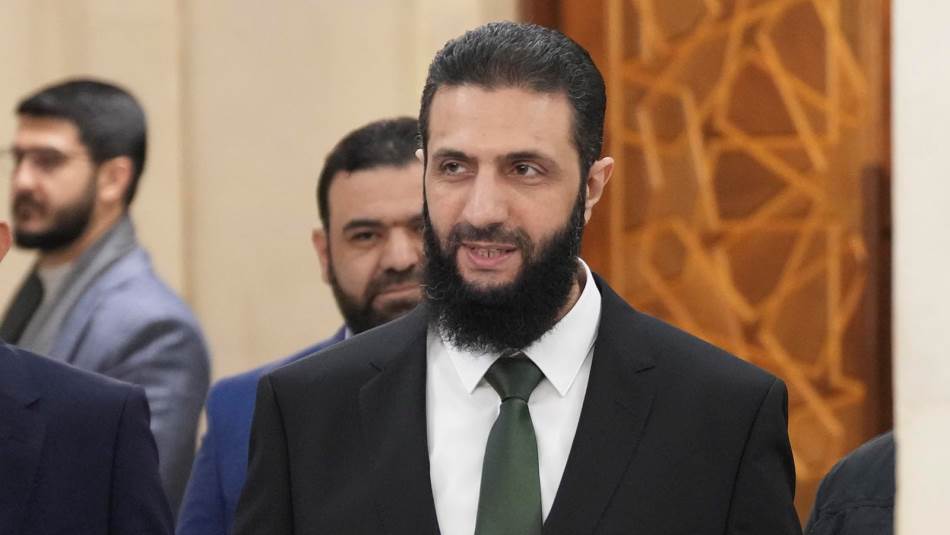Qutaiba Ahmad Badawi is a name Syrians must examine closely. Amid the intricacies of politics, the tight circle surrounding Ahmed Al-Sharaa—formerly known as Jolani—is stepping in to take control of Syria’s economy. “Mughira Al-Banshi,” as he was called during Sharaa’s rule in Idlib, was one of the leading figures managing economic affairs and border crossings in that enclave opposed to the ousted regime. Today, he serves as the Director General of Syrian Customs.
Critics may view these words as signaling a “counter-revolution” or premature and untimely criticism. Many will argue it is natural for Sharaa to appoint trusted confidants to key positions during this precarious transitional period in Syria’s history. After all, the deposed regime still has loyalists inside Syria and in neighboring countries, not to mention potential regional plots against the changes in Syria.
Such reasoning might be persuasive, were it not for appointments rooted in loyalty and, at times, personal connections. It is widely believed, for instance, that Qutaiba Badawi, the newly appointed customs director, is Sharaa’s brother-in-law. Yet, this issue extends beyond familial ties to encompass statements and policies that suggest the new leadership may be aiming to consolidate long-term power.
Take, for instance, Sharaa’s own remarks during a recent meeting with media professionals in Damascus. He stated that the caretaker government is “laying down broad outlines” for Syria’s future. This claim clashes with Prime Minister Mohammed al-Bashir’s mandate to oversee an interim period set to end in March. The mere designation of a three-month interim period suggests either a lack of seriousness or, at best, haste and confusion. Drawing the “broad outlines” for Syria’s future should be the task of a representative body elected by Syrians. Yet, given the current realities, is such a body feasible within three months?
Critics of this view might cite Sharaa’s interview with the BBC, where he announced plans for an inclusive national conference to establish an advisory council to fill the parliamentary and constitutional void during the interim period. He reaffirmed his commitment to the principle that the people have the right to choose their rulers and representatives. While these statements offer partial reassurance, their vagueness—especially concerning timelines—is troubling. Sharaa’s acknowledgment of the absence of infrastructure for elections at present compounds these concerns.
This ambiguity reflects broader traits in the new leadership’s policies, revealing long-term ambitions, unclear plans, and evident missteps. For instance, Prime Minister Al-Bashir announced a 300% salary increase, while Sharaa promised a 400% rise. It remains unclear whether these pledges are grounded in a thorough analysis of the depleted Syrian treasury’s capacity. Furthermore, the risks of inflation loom large if such measures are implemented without careful planning by experts.
“Liberalization” or “protectionism” ?
Statements from Qutaiba Badawi, the new customs director, further underscore these issues. In an interview with Al-Watan Online, he described the dire administrative and technical state of the customs authority. Shortly before, he had dissolved the customs police entirely, pledging to restructure it to serve the public interest. While the customs police, long regarded as a mafia exploiting Syrians, is unlamented, Badawi’s remarks are riddled with contradictions. He spoke of abolishing certain customs fees to ease costs for importers and consumers while simultaneously promising to liberalize imports of goods—except those restricted for “legal and legitimate” reasons—through successive decisions. The emphasis on “legitimate” imports suggests a potential drift toward “official Islamization,” raising alarm among many Syrians. Even more concerning is the contradiction between promises of “liberalizing imports” and plans to introduce tariffs to protect local producers from foreign competition through “customs protection policies.”
Officials in Sharaa’s government have repeatedly emphasized a shift toward a “free market economy,” garnering support from certain business circles, particularly traders. However, this stance has sparked fears among industrialists and economists that Syria could become a dumping ground for foreign goods—especially Turkish products—at the expense of local industries and jobs, already battered by the policies of the former regime.
This tension between “liberalization” and “protectionism” reflects the broader uncertainty surrounding the current leadership’s vision for Syria. This ambiguity in economic policy mirrors the opacity in political direction. Sharaa, who told the BBC he cares more about gaining the trust of Syrians than about foreign perceptions, has not addressed his people directly or extensively through local media to clarify his policies and intentions. Instead, his most prominent appearances have been on CNN and the BBC, focusing primarily on Western concerns rather than Syrian ones.
These concerns about Sharaa’s leadership stem not only from his current statements and policies but also from his seven years of governance in Idlib before moving to Damascus. While his administration in Idlib was far less oppressive than the Assad regime, it was, in essence, a softened version of the same system. Even Qutaiba Badawi, now overseeing Syrian Customs, was previously accused of fostering monopolistic practices in Idlib’s modest economy.
Despite these reservations, there remains a glimmer of hope in Sharaa’s potential for political maturity and administrative prudence. Syrians await actions and assurances from him that their future will not be a milder iteration of their past under the Assad family. To achieve this, Sharaa must clearly define the scope of his interim rule and the temporary nature of his appointees’ roles. An explicit pledge to this effect would go a long way toward rebuilding trust. Moreover, while he and his allies are entitled to aspire to lead Syria, such ambitions must be realized through the ballot box under constitutional and legal frameworks—not through military dominance or the imposition of a fait accompli.
Iyad al-Jaafari is a Syrian political journalist.
This article was translated and edited by The Syrian Observer. The Syrian Observer has not verified the content of this story. Responsibility for the information and views set out in this article lies entirely with the author.


